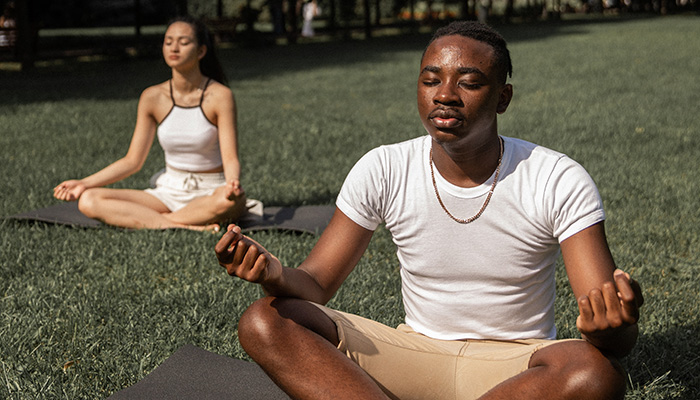Tune into Your Body to Reduce Anxiety
Tune into Your Body to Reduce Anxiety
By Tara Rullo, LCSW
If you have ever suffered from anxiety, you know that it can feel like an uninvited guest that can hijack your thoughts, emotions, and even your physical sensations. It can feel like being trapped in a never-ending loop of fear and doubt, where the world feels like a threatening place, and your own mind becomes your worst enemy. While the mind is racing, anxiety also manifests in physical sensations. Common symptoms include a rapid heartbeat, shortness of breath, sweaty palms, trembling, dizziness, and a churning or queasy feeling in the stomach.
What do you do when you have that sense of anxiety, overwhelm, or pressure? Many people try to “out-think” anxiety, engaging in a debate inside their own minds trying to fight back the negative thoughts and feelings. This cognitive approach can be actually helpful. We can tell ourselves that thoughts are just thoughts.Thoughts are not facts. We can ask our mind to notice the thoughts but not hold on to them. This is an effective practice, and it is certainly a part of treating anxiety, especially when practiced with the support of individual or group therapy.
But no matter how well we wrestle with our minds, if our bodies are screaming for help, we will struggle to feel that everything is okay. This is where body awareness can be a powerful tool in treating anxiety and nervous system regulation. Body awareness practices involve tuning into your body and its sensations with moment to moment awareness. Using body awareness is a trauma-informed approach to treating anxiety as it recognizes that trauma can lead to a state of hypervigilance, where the individual remains on high alert for potential threats. This constant state of arousal can contribute to ongoing anxiety and physical tension.
Some benefits of body awareness are:
Grounding: Body awareness practices can help you stay grounded in the present moment. Anxiety often involves worrying about the future or ruminating on the past. By focusing on your body and its sensations in the present, you can redirect your attention away from anxious thoughts.
Stress Reduction: Body awareness practices can help reduce the physical manifestations of stress, such as muscle tension. When you become aware of tension in your body, you can consciously relax those muscles, which sends signals to your brain to reduce the stress response.
Breath Awareness: Breathing is a key component of many body awareness practices. Deep, slow, and controlled breathing can activate the parasympathetic nervous system, which helps calm the “fight or flight” response associated with anxiety. It also increases oxygen flow, which can improve cognitive function and reduce anxiety.
Improved Mind-Body Connection: Trauma can cause individuals to disconnect from their bodies as a way to cope with overwhelming emotions or sensations. This disconnection can lead to a separation between their conscious awareness and their physical experiences, making it challenging to process and release stored anxiety. Developing body awareness strengthens the connection between your mind and body. This increased awareness can help you recognize early signs of anxiety and take proactive steps to manage it.
Here are some body awareness practices that can be helpful for anxiety and nervous system regulation:
• Somatic Meditation: Focusing on your breath, bodily sensations, or the present moment in a non-judgmental way can be incredibly effective.
• Yoga: Yoga combines physical postures, breathing techniques, and meditation to enhance body awareness and promote relaxation.
• Progressive Muscle Relaxation: This involves systematically tensing and then relaxing different muscle groups in your body, promoting physical and mental relaxation.
• Body Scan: A body scan meditation involves mentally scanning your body from head to toe, paying attention to each part and releasing any tension you notice.
• Breathwork: Various breathwork techniques, including long, slow breathing can help regulate your nervous system and reduce anxiety.
It’s important to note that while body awareness practices can be very effective, they may not be a standalone solution for severe anxiety or other mental health conditions. They are often most beneficial when integrated into a comprehensive approach to mental well-being, which may include therapy, medication, and lifestyle changes. If you have persistent or severe anxiety, it’s a good idea to consult a mental health professional for guidance and support.



